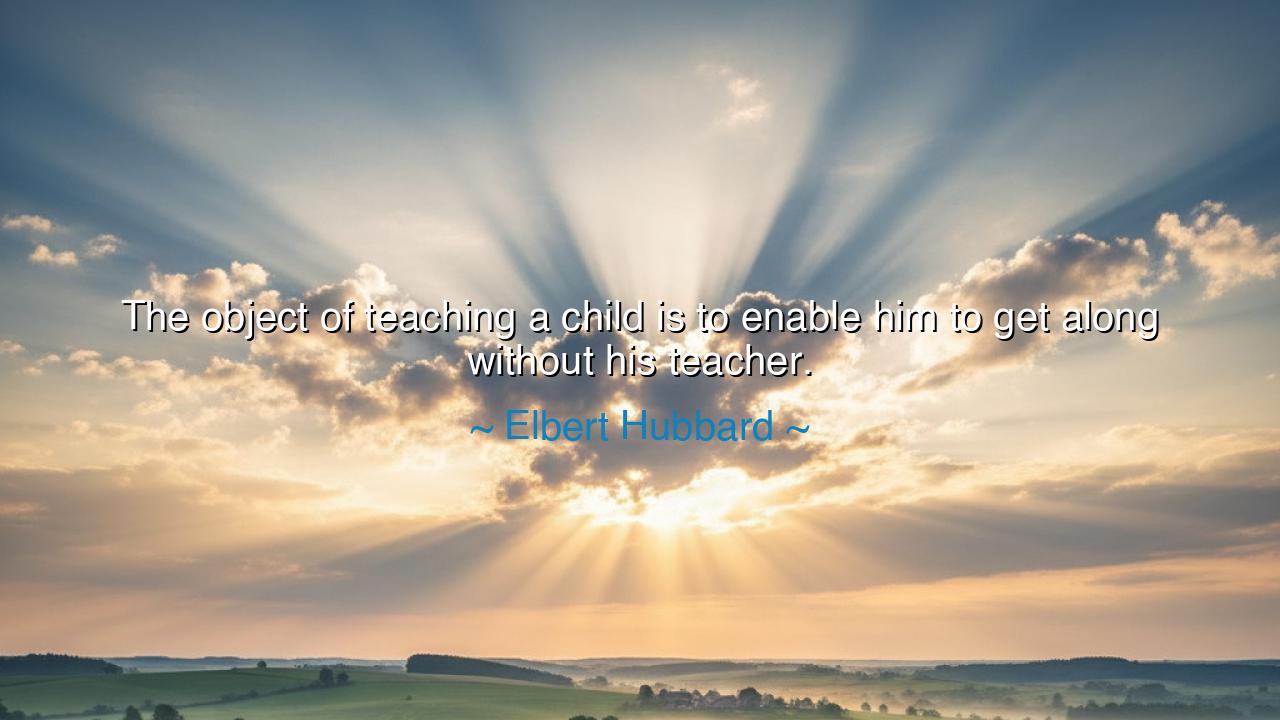
The object of teaching a child is to enable him to get along






Elbert Hubbard declared: “The object of teaching a child is to enable him to get along without his teacher.” These words, simple yet profound, hold within them the eternal secret of wisdom itself. For what is the purpose of guidance, if not to set the guided free? What is the aim of the mentor, if not to withdraw when the disciple can walk alone? To teach is not to bind, but to release; not to create dependence, but to awaken strength. Thus the true teacher is like the flame that lights another lamp, then steps aside, content that the light now shines on its own.
The ancients understood this truth. The philosopher Socrates did not fill his pupils with answers, but instead questioned them until their own minds caught fire. He believed that knowledge, once awakened, must spring from within, like water from a deep well. Plato, though his disciple, soon walked his own path, and from that independence gave birth to a school of thought that endured for centuries. Here lies the essence of Hubbard’s vision: the teacher prepares the ground, but the child must grow his own roots and bear his own fruit.
Consider also the story of Chanakya, the great mentor of Chandragupta Maurya, who would go on to found one of the greatest empires in India. Chanakya’s role was not to rule for his pupil, nor to remain forever by his side, but to instill in him the knowledge, discipline, and courage to govern alone. When Chandragupta was ready, he no longer needed the presence of his master; yet the spirit of that teaching lived on in every law he passed and every victory he won. The master disappeared, but his wisdom endured, embodied in the independence of his student.
This is the heart of true education: that the one who learns may someday stand without leaning, speak without echoing, act without prompting. To withhold independence is to betray the purpose of teaching. A child who forever clings to the hand of his guide has not been truly taught, but only tethered. Real wisdom frees; false wisdom enslaves. Therefore, the highest duty of the teacher is to become unnecessary.
Yet there is sorrow and beauty in this. For every parent, every mentor, every guide must one day endure the pain of stepping back. The eagle pushes its young from the nest, not from cruelty, but from love — for only then can the wings discover their strength. The gardener does not cling to the seedling; he lets it reach toward the sky. So too must the teacher release the child, trusting that the roots of instruction will hold even when the voice of the master is silent.
The lesson is clear: in our own lives, whether as guides or as learners, we must embrace independence as the fruit of wisdom. If you are a teacher, labor not to create followers, but to awaken leaders. Give not answers only, but questions that ignite the mind. If you are a student, honor your guides not by remaining forever in their shadow, but by surpassing them, by carrying their torch further than they themselves could reach.
Practically, this means fostering self-reliance in every step. Parents, allow your children to solve problems without rushing to intervene. Leaders, trust your apprentices with responsibility before they think themselves ready. Learners, dare to walk paths untraveled, even when the master’s hand is absent. In this way, the chain of wisdom remains unbroken, not through dependence, but through the courage to stand alone.
Thus Hubbard’s teaching resounds across the ages: “The object of teaching a child is to enable him to get along without his teacher.” Let us remember it well. For the goal of all instruction, of all guidance, of all love that seeks the good of another, is freedom — the moment when the lamp burns by itself, casting light upon a world still waiting to be illumined.






AAdministratorAdministrator
Welcome, honored guests. Please leave a comment, we will respond soon